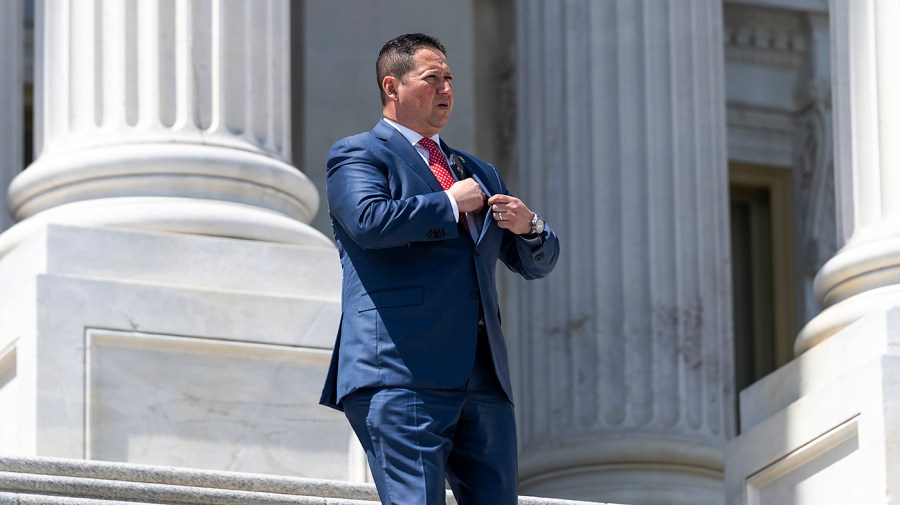
New Congressional Hispanic Conference Chair Tony Gonzales (R-Texas) plans to make the group of around a dozen Hispanic House Republicans a more vocal and organized bloc — building off the record Hispanic and Latino support for President Trump and the Republican ticket in the 2024 election.
“Everyone talks about us, everyone likes to kind of champion some of these different ideas. But who better to champion these ideas [than] the people that are actually in those districts, the people that actually represent Hispanic communities?” Gonzales, who was elected as chair last week, told The Hill in an interview.
Exit polls from the 2024 presidential election found that Trump won 46 percent of Hispanic and Latino voters, setting a new record for Republican support in presidential races.
Now, Gonzales wants to go big with the Congressional Hispanic Conference, saying it has been “behind the scenes for too long.”
“I’m in. Like, I’m so in,” Gonzales said. “I’m ready to go and really, really turn up the heat here.”
Gonzales made his first major statement in his new capacity in a letter to Speaker Mike Johnson (R-La.) on Wednesday evening, leading seven other members of the caucus in expressing concern about potential cuts to Medicaid, Supplemental Nutrition Assistance Program (SNAP) benefits, and Pell Grants in the House’s budget reconciliation outline.
“Hispanic Americans are the future of the Republican Party, and they are closely watching to see if we will govern in a way that honors their values and delivers results,” the member said in the letter.
Policy priorities for the Congressional Hispanic Conference include not only securing the southern border, but also “unleashing energy dominance” and kitchen table issues like protecting the child tax credit, Gonzales said, with high hopes of utilizing the members’ positions on top committees to push that agenda.
But it is the group’s interaction with and reaction to the Trump administration’s dramatic moves on immigration and border policy that will be closely watched. Gonzales, without talking about specific policies, said he expects to “have frank conversations with the administration on issues that I think we live and know best.”
The Congressional Hispanic Conference was founded in 2003 by Rep. Mario Diaz-Balart (R-Fla.), who was a co-chair with Gonzales in the last Congress, and other Hispanic GOP members.
The group is not to be confused with the Congressional Hispanic Caucus, which comprises around three dozen House Democrats. That group has sharply criticized Trump’s attempt to end birthright citizenship, his sending migrants to be detained at Guantánamo Bay and his goal of mass deportations, among other moves.
As Gonzales fully takes the reins of the Congressional Hispanic Conference, he is open to collaboration with his Democratic counterparts: “I think there may be some opportunities there, as well.”
“Not for everything, because we clearly have different views of the world,” he clarified. But Gonzales is interested in getting to “sit down and get back to being legislators, where we have debate and we have dialogue, whether they’re publicly or privately, in order to get to a point to where we make a piece of legislation a little bit better.”
“I think that that art is starting to get lost in Congress,” Gonzales said.
Hispanic and Latino House Republicans have often declined to criticize or have even praised many Trump administration moves. But there are some disagreements: Rep. Carlos Gimenez (R-Fla.) told The Hill earlier this year that he does not think Trump can unilaterally end birthright citizenship. And NBC News reported that Rep. Maria Elvira Salazar (R-Fla.) sent a letter asking for due process and protection from deportation for those affected by slashes to a parole program for Cubans, Haitians, Nicaraguans and Venezuelans.
Gonzales himself has also been a major figure in past GOP disputes about immigration policy, calling a version of a House GOP border security bill in 2023 “un-Christian” and “anti-immigrant” over how it handled legal routes to enter the country.
But after trading public barbs and working out differences, Gonzales eventually got what he wanted and supported the bill — at the time crediting the Congressional Hispanic Conference for sticking together so House GOP leadership knew he “wasn’t an island.”
In this Congress, Gonzales sees it at his job as leader of the Congressional Hispanic Conference to “take all the arrows for everyone else,” comparing his role to that of leaders from his time in the military who took the worst of the job and gave the rewards to everyone else.
“When I have worked with leaders that thought in that manner, boy, do organizations take off,” Gonzales said. “That’s not necessarily commonplace in Congress.”
Along with Gonzales, the group elected four vice chairs: Gimenez is vice chair of community outreach; Rep. Nicole Malliotakis (R-N.Y.) is vice chair of policy; Rep. Monica De La Cruz (R-Texas) is vice chair of communications; and Rep. Juan Ciscomani (R-Ariz.) is vice chair of member services.
“My job is to make sure that the Congressional Hispanic Conference is relevant and we have a seat at the table, and our voices are heard, and our members are rewarded with their priorities, getting over the finish line, their constituents getting their voices heard and then ultimately, our members getting reelected,” Gonzales said.












